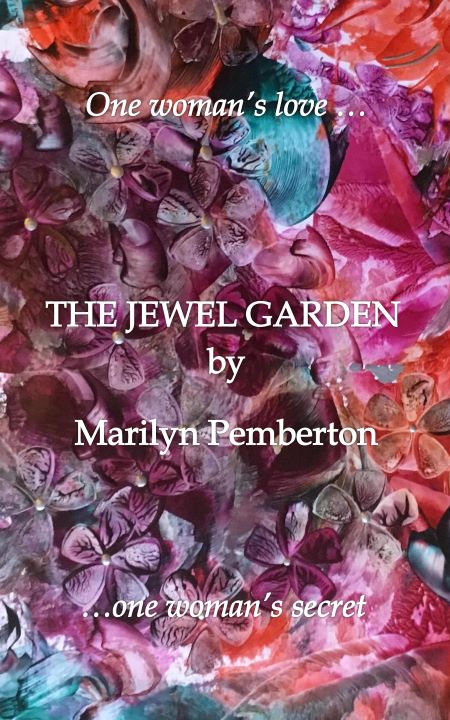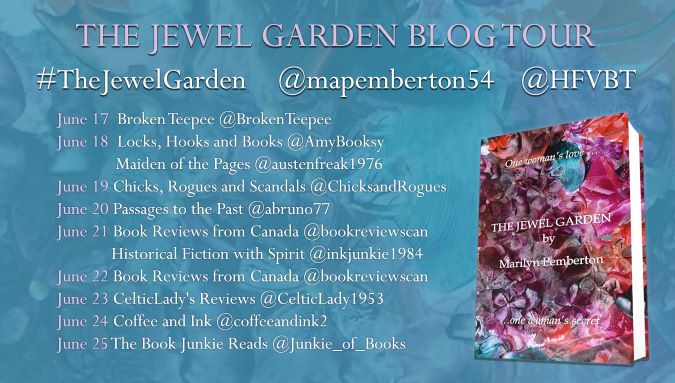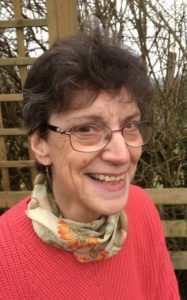Hello Marilyn and welcome to Passages to the Past! Thanks so much for stopping by today to talk about The Jewel Garden!
To begin, can you please tell us a little about yourself and your writing?
I have always worked in I.T. and am still a full-time project manager, although I am planning to retire at the end of 2019 (and am counting the months). I didn’t go to university after school but at the age of 40, I decided I wanted to exercise the right side of my brain and so commenced a part-time BA in English literature at Warwick University. This progressed to an MA and then to a Ph.D. on the utopian & dystopian aspects of Victorian fairy tales. After giving a paper at a conference I was approached by a publisher who suggested I gather together some lesser known fairy tales and as a result Enchanted Ideologies: A Collection of Rediscovered Nineteenth-Century English Moral Fairy Tales was published by The True Bill Press in 2010.
During my research, I “discovered” Mary De Morgan, a Victorian writer of fairy tales, amongst many other things. I became somewhat obsessed with De Morgan and as I wanted to share my research I wrote Out of the Shadows: The Life and Works of Mary De Morgan, which was published by Cambridge Scholars Publishing in 2012. I felt bereft once the book was published and wanted to continue writing, so I joined a writing group and the rest, as the saying goes, is history.
What inspired you to write The Jewel Garden?
Although I had written the biography of Mary De Morgan, there was still a lot I didn’t know. For instance, why had she never married, what triggered her going to live in Egypt, how on earth did she become a directress of a girls’ reformatory in Helouan? As I wanted to continue to write it was a fairly easy decision to write a fictional account of Mary De Morgan’s life and fill in these gaps myself. I decided to write from a fictional protagonist’s point of view and imagine if she had been Mary’s close friend, even thinking herself to be in love with her. So Hannah Russell was born.
What research did you undertake when writing The Jewel Garden?
I had done most of my research on Mary herself when I wrote her biography. But I now had to research more about what Hannah and Mary would have actually experienced. What happened, for instance, during their “do good” visits to one of the East End families, how might they have travelled to Lynton for their holiday together, what would it have been like to attend a Fabian Society talk or a Jewish wedding, how would they have travelled to Egypt, what would life in the girls’ reformatory have been like, how would Hannah have coped with Mary’s death (spoiler alert!), how might Mary’s mother’s spiritualism have affected Mary and Hannah?
What was your favorite scene to write?
Surprisingly enough, the scenes where Hannah is grieving at the loss of her friend.
What was the most difficult scene to write?
Probably the scene when Hannah realizes how she has misunderstood her relationship with Mary.
When did you know you wanted to be a writer?
When I realized that I didn’t want to stop writing once the biography had been published but that I wanted to continue and tell stories. This was at the age of 60.
What does your daily writing routine look like?
Up until recently I only ever wrote at weekends. I still have a stressful full-time job and I never seemed to have the energy or inclination to write in the evenings. I started by doing all the other “writerly” things that have to be done as well as the novel: writing my infrequent blog, submitting to competitions, writing articles for journals or talks I sometimes give at libraries. This all takes time but eventually, I sit and continue to write the next scenes I have plotted and been thinking about during the week.
However, I got rid of my TV a few weeks ago, and although I can’t say I have a routine, I find that without the temptation of the TV I now am quite happy to turn on the laptop and do some writing, even if it is just for an hour or so. I will probably get all the non-novel-writing tasks out of the way during the week in order to leave the weekends clear for the main project.
What has been your greatest challenge as a writer? Have you been able to overcome it?
I suppose lack of time. I have decided to retire at the end of 2019 (earlier than originally planned by 9 months) and one of the reasons is so that I can spend more time on doing the things I love, such as walking, gardening, decorating and WRITING.
Who are your writing inspirations?
All the authors of books I read; either to write better than them or as good as them. They are all published, so I can be too.
What was the first historical novel you read?
I have been reading for the last 60 odd years and I can’t recall the very first historical novel I ever read. As a child I loved the Biggles books by W. E Johns - they were set in the 2nd World War, are they classed as historical? I don’t think this was the first “proper” historical novel I read as an adult, but I have always remembered reading and loving The Far Pavilions by M. M. Kaye.
What is the last historical novel you read?
The Burning Chambers by Kate Mosse.
What are three things people may not know about you?
My mother was born in Egypt, although she was of Maltese (and therefore British) nationality.
I have been married more times than I like to admit to anyone.
My second child, Philippa, died at 3 months old.
What appeals to you most about your chosen genre?
I love imagining how things might have been rather than what they are now. I love the research side of writing historical novels and I love thinking about how people might have lived and loved.
What historical time period do you gravitate towards the most with your personal reading?
I tend to gravitate to an author rather than a period.
What do you like to do when you aren't writing?
Reading, doing crosswords, walking, planning what to do when I retire.
Lastly, what are you working on next?
My second novel, Song of the Nightingale, is waiting to be snapped up by literary agents (ha!). It tells of two young Italian boys who are bought from their poor parents, castrated, and sent to a conservatoire to be taught to sing. The novel spans ten years and is told in the first person from the point of view of the boys’ guardian, Philippe. The fate of the boys as castrati is an integral part of the tale, of course, but it is also a story of adulterous passion, deceit, murderous revenge, guilt, and enduring love.
I am now working on my third novel, Grandmothers’ Footsteps. It will tell of four generations of women and their attempts to tell “herstories” through their writing to a world deaf to the female voice. I am interested in the re-telling of stories, especially the fairy tale, through the centuries, and I will weave my own throughout the book as a link between the women.
That sounds amazing, I can't wait to read both of those books! Thank you for spending time with us today, Marilyn!

The Jewel Garden by Marilyn Pemberton
Publication Date: February 28, 2018
Williams & Whiting
eBook & Paperback; 388 Pages
ISBN-13: 978-1912582037
Genre: Historical Fiction
It was a time when women were starting to rebel against Victorian conventions and to strive for their independence. This is a story of Hannah Russell’s physical, emotional and artistic journey from the back streets of the East End of London to the noisy souks and sandy wastes of Egypt; from the labyrinthine canals of Venice to the lonely corridors of Russell Hall in Kent. Hannah thinks she has found love with Mary De Morgan, a writer of fairy tales and one of William Morris’s circle of friends. But where there is devotion there can also be deceit and where there is hope there also dwells despair.
Available on Amazon
About the Author
Marilyn Pemberton has always worked in IT and is still a full-time project manager, but is hoping to retire very soon. At the age of 40, she decided she wanted to exercise the right side of her brain and so commenced a part-time BA in English literature. This progressed to an MA and then to a PhD on the utopian & dystopian aspects of Victorian fairy tales. During her research, Marilyn “discovered” Mary De Morgan, a Victorian writer of fairy tales, amongst many other things. She became somewhat obsessed with De Morgan and as she wanted to share her research she wrote Out of the Shadows: The Life and Works of Mary De Morgan, which was published by Cambridge Scholars Publishing in 2012. Despite her intensive research, there were still many gaps in her knowledge and because she just could not let De Morgan, or the act of writing, go she decided to write a fictional novel based on De Morgan’s life – the result being "The Jewel Garden."Marilyn is currently looking for representation for her second novel, "Song of the Nightingale," which is set in 18th century Italy and tells of two young boys who are bought from their families, castrated and then trained to be singers. The fate of the boys as castrati is an integral part of the tale, of course, but it is also a story of adulterous passion, deceit, murderous revenge, guilt, and enduring love. Marilyn is now working on a third novel called "Grandmothers' Footsteps" that will tell of four generations of women and their attempts to tell their “herstories” to a world deaf to the female voice.
Website | Facebook | Twitter | Goodreads
Blog Tour Schedule
Monday, June 17Excerpt at Broken Teepee
Tuesday, June 18
Review at Locks, Hooks and Books
Interview at Maiden of the Pages
Wednesday, June 19
Feature at Chicks, Rogues and Scandals
Thursday, June 20
Interview at Passages to the Past
Friday, June 21
Review at Book Reviews from Canada
Excerpt at Historical Fiction with Spirit
Saturday, June 22
Guest Post at Book Reviews from Canada
Sunday, June 23
Feature at CelticLady's Reviews
Monday, June 24
Review at Coffee and Ink
Tuesday, June 25
Excerpt at The Book Junkie Reads


















No comments:
Post a Comment